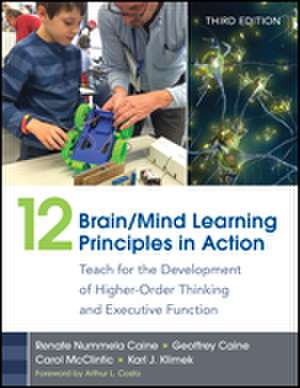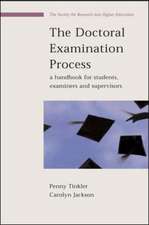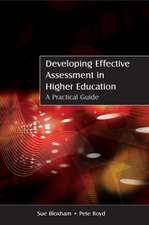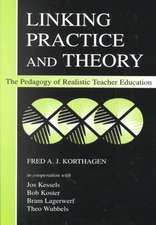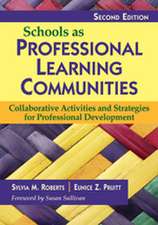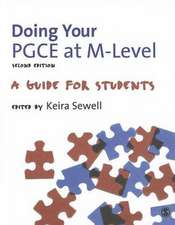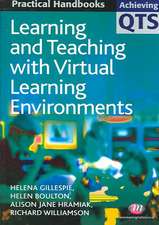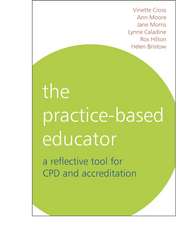12 Brain/Mind Learning Principles in Action: Teach for the Development of Higher-Order Thinking and Executive Function
Autor Renate Nummela Caine, Geoffrey Caine, Carol Lynn McClintic, Karl J. Klimeken Limba Engleză Paperback – 28 sep 2015
Now in an expanded third edition, Caine et al. offer three practical approaches to instruction—direct, problem or project-based learning, and the guided experience approach—while providing common-sense strategies to turn theory into effective classroom teaching. Features of the new edition include
- More strategies to deeply engage students and build foundational learning skills
- Guidance on peer-based professional development through Process Learning Circles
- Reflective questions and checklists for assessing progress
- Updated, real-life examples that illustrate brain-compatible learning in action
| Toate formatele și edițiile | Preț | Express |
|---|---|---|
| Paperback (1) | 330.99 lei 3-5 săpt. | |
| SAGE Publications – 28 sep 2015 | 330.99 lei 3-5 săpt. | |
| Hardback (1) | 381.85 lei 43-49 zile | |
| SAGE Publications – 17 sep 2008 | 381.85 lei 43-49 zile |
Preț: 330.99 lei
Nou
Puncte Express: 496
Preț estimativ în valută:
63.34€ • 65.34$ • 52.85£
63.34€ • 65.34$ • 52.85£
Carte disponibilă
Livrare economică 05-19 martie
Preluare comenzi: 021 569.72.76
Specificații
ISBN-13: 9781483382722
ISBN-10: 1483382729
Pagini: 320
Dimensiuni: 216 x 279 x 23 mm
Greutate: 0.89 kg
Ediția:Third Edition
Editura: SAGE Publications
Colecția Corwin
Locul publicării:Thousand Oaks, United States
ISBN-10: 1483382729
Pagini: 320
Dimensiuni: 216 x 279 x 23 mm
Greutate: 0.89 kg
Ediția:Third Edition
Editura: SAGE Publications
Colecția Corwin
Locul publicării:Thousand Oaks, United States
Recenzii
“In today’s education world of standardization and prescriptive narrow testing outcomes, this book reminds us as educators and leaders what it means to be human. The research and examples paint a clear picture of how we learn and provide a path towards student-centered-learning that reflects our intelligence and connectedness. Administrators and educators looking for innovative solutions and a means to meet students where they are, and then advance beyond, would be wise to adopt this third edition of 12 Brain/Mind Learning Principles in Action. I encourage schools to include this book in their professional development and learning community.”
“12 Brain/Mind Learning Principles in Action is a treasure trove of thoughtful, heartfelt, and effective ideas that will empower brains to grow, minds to expand, and classrooms to thrive. In our present system good teaching is often a subversive act – use this as a manual for guerilla warfare.”
“Building a bridge between brain/mind research and the traditional education system has been problematic for decades. This book provides that bridge, both to empower the minds of students and to enable teachers to free themselves from age-old practices. The research cited creates one bridge and the “guided experience” style of the book creates another bridge to utilization of the concepts. The authors understand how the brain works and have developed methods to create meaningful learning communities.”
“This book focuses on the fundamentals—how to use dialogue to help learners create, interpret, and apply knowledge; explore relationships; make critical decisions; think on their feet; and communicate more effectively.”
"It is my fondest hope that this book receives the attention it deserves from every segment of the educational community: teachers, administrators, teacher trainers, curriculum experts, learning psychologists, policy makers, politicians, parents, and prospective educators. It provides compelling evidence that the traditional paradigm of education, which emphasizes “factual” learning, above all is profoundly narrow and limiting. It brilliantly creates a linkage to the contemporary obsession with “standards” of various kinds where one exists to its occasional emphases on higher-order thinking and active learning. The volume, depth, and relevance of research the authors bring to the fore about effective and lasting models of teaching, learning, and leadership is impressive. May its brilliant and enlightening message once and for all replace the limited and limiting habits of mind that have legitimated educational policy and practice for centuries in the Western World."
“12 Brain/Mind Learning Principles in Action is a treasure trove of thoughtful, heartfelt, and effective ideas that will empower brains to grow, minds to expand, and classrooms to thrive. In our present system good teaching is often a subversive act – use this as a manual for guerilla warfare.”
“Building a bridge between brain/mind research and the traditional education system has been problematic for decades. This book provides that bridge, both to empower the minds of students and to enable teachers to free themselves from age-old practices. The research cited creates one bridge and the “guided experience” style of the book creates another bridge to utilization of the concepts. The authors understand how the brain works and have developed methods to create meaningful learning communities.”
“This book focuses on the fundamentals—how to use dialogue to help learners create, interpret, and apply knowledge; explore relationships; make critical decisions; think on their feet; and communicate more effectively.”
"It is my fondest hope that this book receives the attention it deserves from every segment of the educational community: teachers, administrators, teacher trainers, curriculum experts, learning psychologists, policy makers, politicians, parents, and prospective educators. It provides compelling evidence that the traditional paradigm of education, which emphasizes “factual” learning, above all is profoundly narrow and limiting. It brilliantly creates a linkage to the contemporary obsession with “standards” of various kinds where one exists to its occasional emphases on higher-order thinking and active learning. The volume, depth, and relevance of research the authors bring to the fore about effective and lasting models of teaching, learning, and leadership is impressive. May its brilliant and enlightening message once and for all replace the limited and limiting habits of mind that have legitimated educational policy and practice for centuries in the Western World."
Cuprins
Foreword to the Third Edition
Preface
Acknowledgments
About the Authors
1. Getting Started
PART I: The First Foundational Element--Relaxed Alertness
2. Why Relaxed Alertness Provides the Optimum Emotional Climate for Learning
3. Brain/Mind Learning Principle—Complex Learning Is Enhanced by Challenge and Inhibited by Threat, Helplessness, and Fatigue
4. Brain/Mind Learning Principle--The Brain/Mind Is Social
5. Brain/Mind Learning Principle--The Search for Meaning Is Innate
6. Brain/Mind Learning Principle--Emotions Are Critical to Patterning
PART II: The Second Foundational Element--Orchestrated Immersion in Complex Experience
7. Creating the Richest Learning Environments Using Orchestrated Immersion in Complex Experience
8. Brain/Mind Learning Principle--The Brain/Mind Processes Parts and Wholes Simultaneously
9. Brain/Mind Learning Principle--All Learning Engages the Physiology
10. Brain/Mind Learning Principle--The Search for Meaning Occurs Through Patterning
11. Brain/Mind Learning Principle--Learning Is Developmental
PART III: The Third Foundational Element--Active Processing of Experience
12. Helping Learners Digest and Consolidate Learning
13. Brain/Mind Learning Principle--Each Brain Is Uniquely Organized
14. Brain/Mind Learning Principle--There Are at Least Two Ways to Approach Memory
15. Brain/Mind Learning Principle--Learning Engages Both Focused Attention and Peripheral Perception
16. Brain/Mind Learning Principle--Learning Is Both Conscious and Unconscious
17. Teaching with Body/Mind Interconnectedness in Mind
Resource A: The Brain/Mind Capacities Wheel
Resource B: The Brain/Mind Principles Wheel
Resource C: How to Develop Process Learning Circles
Resource D: Guided Experiences Cycle
Resource E: Guidelines for the Guided Experiences Model
Resource F: Global Experiences Design Wheel
Resource G: Sensory Poem
References
Index
Preface
Acknowledgments
About the Authors
1. Getting Started
PART I: The First Foundational Element--Relaxed Alertness
2. Why Relaxed Alertness Provides the Optimum Emotional Climate for Learning
3. Brain/Mind Learning Principle—Complex Learning Is Enhanced by Challenge and Inhibited by Threat, Helplessness, and Fatigue
4. Brain/Mind Learning Principle--The Brain/Mind Is Social
5. Brain/Mind Learning Principle--The Search for Meaning Is Innate
6. Brain/Mind Learning Principle--Emotions Are Critical to Patterning
PART II: The Second Foundational Element--Orchestrated Immersion in Complex Experience
7. Creating the Richest Learning Environments Using Orchestrated Immersion in Complex Experience
8. Brain/Mind Learning Principle--The Brain/Mind Processes Parts and Wholes Simultaneously
9. Brain/Mind Learning Principle--All Learning Engages the Physiology
10. Brain/Mind Learning Principle--The Search for Meaning Occurs Through Patterning
11. Brain/Mind Learning Principle--Learning Is Developmental
PART III: The Third Foundational Element--Active Processing of Experience
12. Helping Learners Digest and Consolidate Learning
13. Brain/Mind Learning Principle--Each Brain Is Uniquely Organized
14. Brain/Mind Learning Principle--There Are at Least Two Ways to Approach Memory
15. Brain/Mind Learning Principle--Learning Engages Both Focused Attention and Peripheral Perception
16. Brain/Mind Learning Principle--Learning Is Both Conscious and Unconscious
17. Teaching with Body/Mind Interconnectedness in Mind
Resource A: The Brain/Mind Capacities Wheel
Resource B: The Brain/Mind Principles Wheel
Resource C: How to Develop Process Learning Circles
Resource D: Guided Experiences Cycle
Resource E: Guidelines for the Guided Experiences Model
Resource F: Global Experiences Design Wheel
Resource G: Sensory Poem
References
Index
Notă biografică
Descriere
Updated with new scientific discoveries, this indispensable guide links brain research with innovative teaching techniques that strengthen students’ critical thinking abilities and other key skills.
